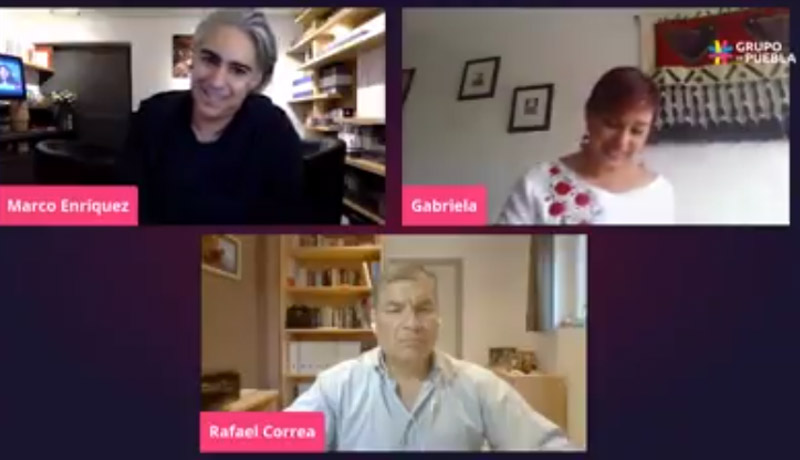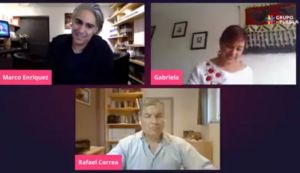
This Wednesday the former President was part of the second episode of “Conversations of change with the Grupo de Puebla”, conducted by the Chilean Marco Enríquez-Ominami. Ecuatorian Assembly member Gabriela Rivadeneira was also a part of the conversation.
 Former President of Ecuador, Rafael Correa, along with the Assembly member of his country, Gabriela Rivadeneira, were part of the second episode of “Conversations of change with the Grupo de Puebla”, an event driven by the group of progressive leaders from Iberoamerica and directed by the Chilean Marco Enríquez-Ominami.
Former President of Ecuador, Rafael Correa, along with the Assembly member of his country, Gabriela Rivadeneira, were part of the second episode of “Conversations of change with the Grupo de Puebla”, an event driven by the group of progressive leaders from Iberoamerica and directed by the Chilean Marco Enríquez-Ominami.
During the conversation, Correa pointed out the bad management of the current Ecuadorian government, led by President Lenin Moreno, in terms of economic and sanitary measures in order to face the spread of coronavirus. He also said: “there are countries living a catastrophe as a result of bad governments”.
Along the same lines, the National Assembly member said that “people are dying because of a pandemic horribly treated, people are dying of hunger and and shifting governments is a fundamental issue, not only in Ecuador, but also in other governments of South America.
Correa also reiterated that his county is living “the worst emergency of the century with the worst government in history, asserting that the President is “taking advantage of this crisis, not to face the pandemic, but to apply his fundamentalism”.
About the upcoming election in Ecuador, which will take place on February 2021, former President said “there is a fallacy in saying that, because of the pandemic and the economic issues, election must be suspended. They are just gaining time to eliminate the progressive forces”.
He insisted on saying that “those who tell us we cannot go to vote, are also telling us we can go to work” and he added that any call to unite as a nation is “a smokescreen” with the intention of “keeping complicit silence”.
By last, Rafael Correa supported the initiative of cohabitation in Latin America, which is being led by the Chilean Marco Enríquez-Ominami, arguing that “collective regional action and integration is, not only extremely useful, but also extremely desirable and indispensable”.
The former President mentioned the existence of UNASUR in 2009, when the H1N1 pandemic appeared, and said that at that time “health ministers got together and we had a regional strategy to tackle the virus”, which worked quite well.
“Nowadays, what has Peru done? It moved its military to the border to prevent infected Ecuadorians from going to their country; they mobilized tanks to attach a virus. It is embarrassing to see what has been done in Latin America in such a brief period of time. Of course, with regional integration, this would have been handled a lot better. A coordinated regional action would have helped a lot”, Correa insisted, as he added that the exchange of specialists or group medical purchases would have facilitated in a great way a good strategy to face the current crisis.


